What Real-World Wikipedia Editing is Like

Highlights:
- Making your own Wikipedia article is tougher than it looks. The Internet is replete with articles that say creating a Wikipedia article for your company as simple and easy – which it most certainly is not.
- Wikipedia has rules restricting you from creating your own Wikipedia article or paying someone to create one for you.
- Creating your own Wikipedia article or paying someone to do it (though common) can get your content deleted and your account banned.
- If a Wikipedia editor has not already written a page for you, it’s probable you are not notable enough to have one.
- A good rule of thumb is that you should have at least 10 articles specifically about your company to be considered notable.
There are a lot of articles online that will tell you to make a Wikipedia article to boost your company’s online reputation, brand awareness, traffic, and SEO. A Wikipedia article has the potential to do some of those things (not all of them), but whether you should create one or have one created for you is another matter entirely.
The Internet has taken the difficult and complex task of creating a Wikipedia article for your company – a task that requires the help of experienced “professionals” (read: proven Wikipedia veterans) – and churned out a bunch of very misleading “step-by-step” guides that can easily do you more harm than good.
It’s not that these instructions are wrong, per se – it’s that they’re too optimistic. They don’t convey the reality of the challenge. We are giving you the whole story so you can make an educated decision for your business.
What you’ll learn in this article
- Who can write your Wikipedia article
- The step-by-step process to creating a Wikipedia article
- Why that process probably won’t work for you
- Who can help (and who can’t)
- Common mistakes to avoid
- Structuring the article for readability
- Feature the most basic company info at the top
- Info above the fold should be the most useful
Should I create a Wikipedia article for my business?
Short answer: no. Why? Making your own Wikipedia article is more challenging than the experts tell you. Firstly, if one of the 40+ million Wikipedia editors out there hasn’t created a page about you yet, you probably aren’t notable enough to have a Wikipedia article without some advance preparation work. Most people who come to Reputation X asking for a Wikipedia article are not notable enough without setting the stage for success first.
Secondly, you can – but should not – (a) create your own Wikipedia article nor (b) realistically pay someone else to do it for you. Most paid Wikipedia editors fail in our experience.
Why make a Wikipedia article (or not)
The reasons people typically want to make a Wikipedia article are reputation management, SEO, brand awareness, and web traffic. People and companies with Wikipedia articles are considered more mature, or even more successful.
If you are feeling discouraged about making a page, you will be happy to hear that a Wikipedia article won’t boost your SEO because the links from a Wikipedia article are “nofollow”, which means that Google doesn’t count them – therefore they do not increase the search engine standing of the articles they link to.
A Wikipedia article for your company can give you a boost in brand awareness and traffic because of Google’s big love for Wikipedia, but there are much better ways to campaign for visibility online. For example, a Wikipedia article about your company will almost certainly rank on the first article of search results.
This is not a safe place
Because Wikipedia is collaboratively edited by volunteer editors worldwide, people and companies can be called on the carpet for their deeds or misdeeds; there can be a fair amount of social justice served on the articles of Wikipedia.
What that means for you is that any weakness in corporate social responsibility (CSR) can get you crucified pretty quickly. If there are skeletons in your company closet, competitors or those who do not necessarily wish you well can post them to your Wikipedia article for the world to see.
Just because good news gets posted to your article does not mean that bad news won’t. If there are people who dislike your company, and their references are valid, it’s not likely your article will stay 100% positive for long. This does not apply only to actual misdeeds – people may post damaging errors in your article, and they are not always easy to expunge. You should ask yourself if you want to subject your company to that environment before you make any decisions.
Factual errors are not uncommon on Wikipedia. According to a study published in the PR Journal, 59 percent of respondents indicated that their company or client’s Wikipedia article has one or more factual errors.
Who can write a Wikipedia article?
In theory, anyone can write a Wikipedia article. That is the nature and the beauty of Wikipedia. However, not just anyone can write your Wikipedia article. The main person who CAN’T write your article? You.
Not just anyone can write your Wikipedia article. The main person who CAN’T write your article? You.
That’s right, all the step-by-step, super easy “How to Create a Wikipedia Article for Your Company” guides are not only over-simplified, they can be practically pointless. Writing for a subject you are affiliated with is discouraged and even addressed in Wikipedia’s Terms of Service.
To help prevent bias within the content, Wikipedia has a Conflict of Interest policy that encourages editors to delete content submitted by an editor who has a vested interest in the subject matter.
Your IP address is recorded and shared when you make edits, and one of the 40.2 million Wikipedia editors may sniff you out. If there is inaccurate or unfair material in your Wikipedia article, you can point it out in the article’s talk article, but many users have not had any luck with that method.
Learn about the Wikipedia editing process here
How much does a Wikipedia article cost?
Once most people learn they can’t write their own Wikipedia article, their next question is, “Can I pay someone to write it for me?” Well, you’re not supposed to. But, it’s common to try.
The biggest issue with paying someone to write a Wikipedia article for you is that most people who offer the service are… how to put this… less competent than they say they are. They get banned. Your article gets deleted. Future attempts at creating an article are red-flagged. Second chances are tough in the world of Wikipedia.
You’ll want to know a few things about writing a Wikipedia article, especially your own.
First of all, the author is, if following Wikipedia guidelines, required to disclose that he or she has been paid to edit the article, which dramatically increases the likelihood of the article or the edits being deleted or attacked and changed. In other words, if you follow the rules and disclose the editor was paid, some Wikipedia authors will most likely revert or delete your article because you admitted the edits were paid.
We’ve interviewed a lot of Wikipedia editors (we do not edit Wikipedia, but we set the stage for edits that will be accepted). The cost can range from a couple hundred dollars to several thousand, depending on the complexity of the subject. If you pay someone a couple hundred dollars, you may regret it. Real Wikipedia editors with street credibility and thousands of edits get paid quite a bit. Some editors told us they charge upwards of $10,000 for a single edit. It’s crazy, but it’s a small change for huge companies that want to curate their images online.
They’re sought after because they won’t make risky edits because doing so could get their hard-earned account banned. They are not going to make any edits that might get reversed. A paid Wikipedia editor spends years building her profile. If that profile is banned, they potentially lose tens or hundreds of thousands of dollars. Therefore, if you pay someone to write a Wikipedia article for you, make sure they have skin in the game. Cheap Wikipedia editors don’t have skin in the game so, they will make risky edits.
If you are going to pay someone to write your article, do your homework first. That’s pretty tough because an editor willing to leave the gray hat area of Wikipedia won’t disclose their user name because (according to those we asked) it would be foolish to do so. If you don’t have the name, you cannot check the number of edits they’ve performed or check out their reputation on Wikipedia.
Our recommendation is that Wikipedia articles should never be created by new editors. To avoid immediate deletion, new articles should be written by established editors with thousands of sustained edits and a good reputation, so check your potential writer’s contribution level.
Hiring someone from a freelancer platform like UpWork is a good way to get your article deleted and your account banned. These editors typically do not have the reputation and skill to execute your edits in a way that will be accepted by the Wikipedia community, and we strongly believe Wikipedia editors monitor platforms like Upwork and Fiverr to catch people buying and selling Wikipedia edits.
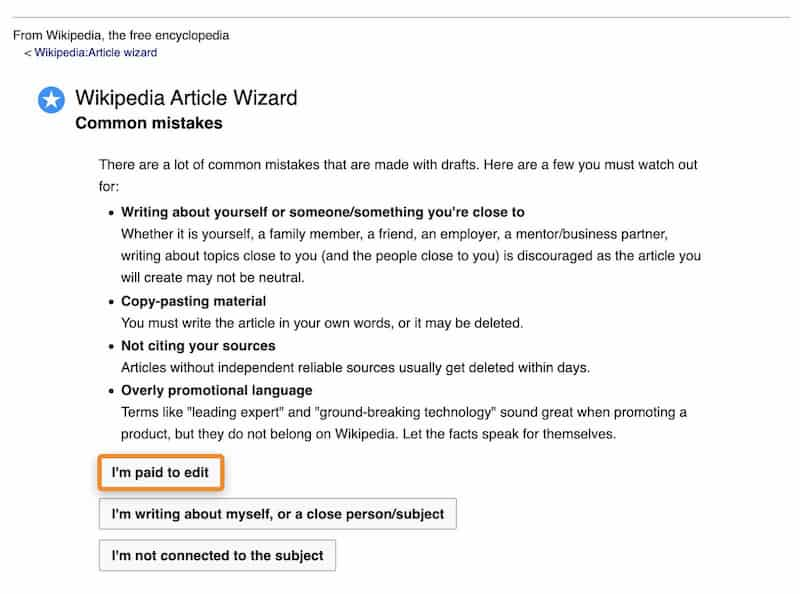
Finally, similar to the aforementioned point on notability, if a company has to pay someone to write a Wikipedia article for them, they are usually not notable enough to have one. It does happen.
Reputation X estimates that upwards of 80% of companies that request a Wikipedia article be written are not notable enough. Some are “close” to notable enough, though, and in that case, we build out their real-world credibility with necessary sources. It is imperative it’s done right the first time.
The Articles for Creation process (AfC)
Articles for Creation (AfC) is a process on Wikipedia that is designed to help editors create new articles. This process is particularly important for new or unregistered editors, as well as those with a conflict of interest, who are not permitted to directly create new pages in Wikipedia’s mainspace. Here’s how it works:
- Drafting: Users can create a draft of their article as a user subpage or within the Draft namespace. It’s a special sort of sandbox on Wikipedia.
- Submission: Once the draft is ready, it can be submitted to the AfC process for review. Reputation X is very good at helping get this draft ready. Our peer-review process ensures it will have the highest probability of acceptance.
- Review: Experienced editors who are part of the WikiProject Articles for Creation review the submissions, but it is glacially slow. Essentially, they check for compliance with Wikipedia’s content policies, including notability, verifiability, and neutrality. These editors are often overwhelmed though.
- Acceptance or Rejection: If the draft meets the standards of the editors reviewing it, it is moved to the mainspace (the part of Wikipedia most people use), becoming a live article. If it does not meet the standards, it is declined.
Wikipedia editing that causes problems
Editing Wikipedia articles without disclosing paid advocacy is something Wikipedia takes seriously – though it’s often hard to identify. Promoting external interests on Wikipedia without revealing affiliation is a violation of the site’s Terms of Service.
In one year, 381 user accounts were blocked for this type of editing in a scandal that involved 210 articles, all of which were deleted. Most of the articles were business-related, and the edits offered biased and skewed information, unattributed materials, and copyright violations. The accounts included many “sock puppet” accounts (accounts that are created for the purpose of deception).
There are Wiki-Hackers that are known for using multiple accounts to execute these types of edits; attack accounts with reputation-damaging content, and then “rescue” them as paid specialists – and even blackmail businesses in some cases.
How to start a Wikipedia article
If you’re set on creating a Wikipedia article, there is a process you will have to go through. Many blogs portray this difficult process as a simple checklist that you can get done in a day. Hubspot even refers to their article as a “quick guide” and claims you can “create a Wikipedia article for your company today.” In our over 15 years of experience, we think that’s not likely.
The process itself isn’t complicated, but Average Joe off the street can’t walk in and create his own article. About 1,000 articles are deleted every day, almost twice as many as the number added. Those that are added are typically done by experts who have no affiliation with the subject they write for.
Create an Account
This step is pretty much what it looks like. On the Wikipedia.org Home article, there is a button in the upper right corner that says, “Create account.” If you click that, you will be asked to choose a username and a password, provide an email address, and enter a captcha. Provide the information and click “Create your account.”
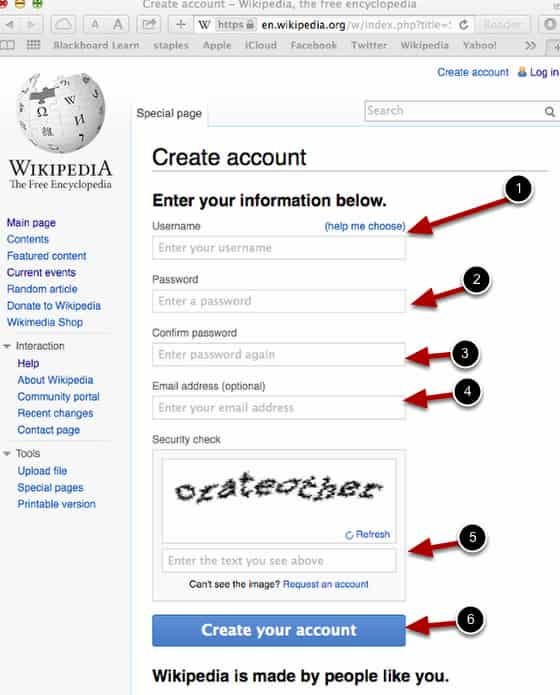
Wikipedia will send you a confirmation email. Click the first link in the email to confirm your address. The link will take you to Wikipedia, and you should be logged in automatically. To log in in the future, click “Log in” in the upper right corner of Wikipedia’s home article (right next to “Create account”).
Become an Autoconfirmed User
Sorry, Hubspot. This step ruins the whole “make an article today” suggestion. Autoconfirmed users are users who have made at least ten edits, even if some were deleted, and have had their account for at least four days.
Triggering Wikipedia’s change filters can affect your autoconfirmed status. The change filters are filters that automatically stop certain users from executing certain actions. For example, users who have made fewer than a specified number of edits might not be able to move articles to titles with trigger words that are indicative of vandalism. If you can wait several days and make a few low-key edits, you should not have much difficulty becoming an autoconfirmed user.
Design and write the article
Once you’re autoconfirmed, the internet’s step-by-step guides will tell you to go ahead and make your article. Using Wikipedia’s Article Wizard, the creation process is pretty intuitive. After clicking on the Article Wizard, you can click “Next” to begin creating your article or you can practice creating an article with the sandbox editor.
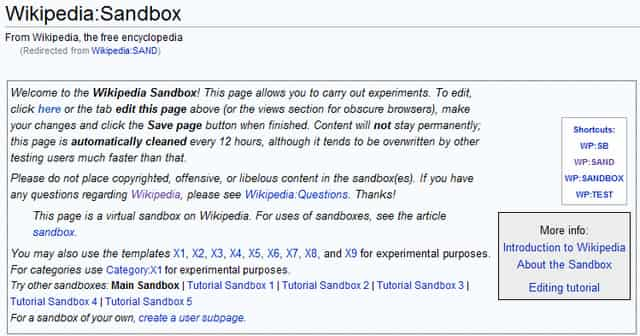
Hubspot provides the following tips for writing your article.
The first three tips are great advice for an editor who is qualified to create a article. The last one is true, but not good advice. When creating a Wikipedia article, it’s important to be as comprehensive as possible. An article with incomplete information is likely to be edited or deleted, and in some cases, those edits might make you wish you were deleted.
Side note: Get ahead of Your scandal
If your company has any controversy whatsoever, it will be added to your Wikipedia article. The editor who adds it might be a lot more venomous than whoever you choose to write your article, so get the information on the article from day one.
Put it low on the article and keep it purely factual. Sugarcoating or downplaying controversy is known as whitewashing (or greenwashing if it’s related to corporate social responsibility) and will draw attention and potentially harsh edits to your article (which, as mentioned, can be hard to change).
This is especially important if you’re trying to use a Wikipedia article as part of a reputation management strategy, but we don’t recommend that. Even if you are honest about your scandal, your citations will link to negative web content and will push that content to the top of Google’s search results.
Include citations
Wikipedia is an encyclopedia. You must include citations to third-party sources. If none exist, your company does not belong on Wikipedia in the first place and won’t be allowed to have its own article.
Most step-by-step guides will tell you to find articles that mention your company, websites that backlink to your website, and directories that link to your company profile. These sources are not likely to be accepted.
Wikipedia wants articles that are:
- Written by notable publications with reputations for fact-checking
- Written specifically about your company
That means they can’t be articles with just a “mention” of your company. They should ideally have your company name in the title of the article.
A good rule of thumb is to have about ten of these articles available before writing your Wikipedia article. Wikipedia says, “Social media, press releases, and corporate/professional profiles do not qualify.”
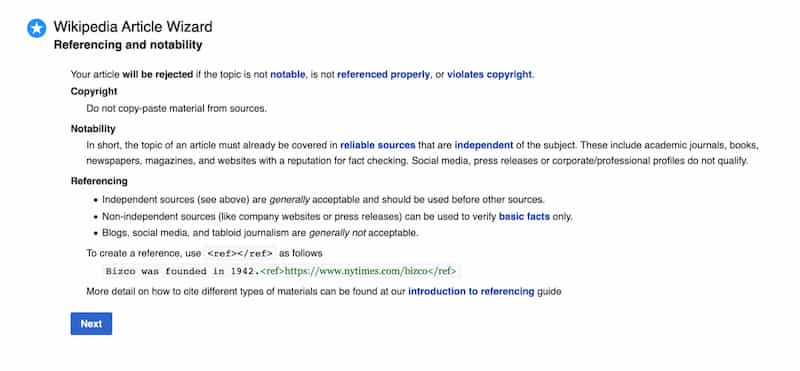
Submit for review
Evaluation times can range from three to six months. If your article is published, you will get a notification in your email. New articles are NOINDEXed so search engines won’t see them. After 90 days, once editors have had time to crawl the article and make edits or recommend deletion, the article will be indexed.
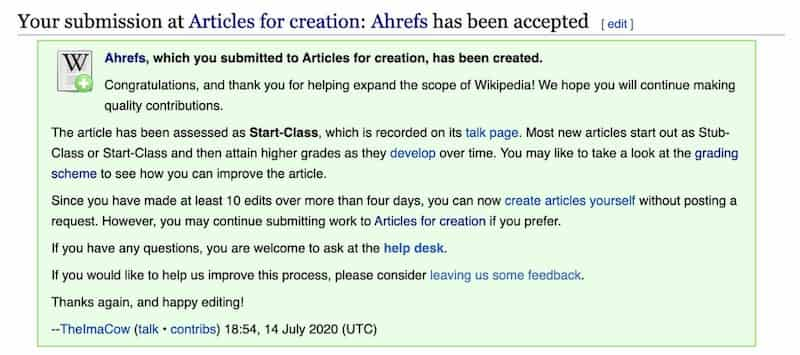
How do I manage my Wikipedia article?
The last step in many misinformed guides is to regularly update your article to keep the information fresh and accurate. This is a bad idea for the same reason it’s a bad idea to write your own article.
There are currently 130,385 active editors. At least one of them is going to see your edit, check your IP address and your account could be banned. If that happens, your edits will be deleted. It’s not worth it.
Wikipedia FAQs
Who owns Wikipedia?
The Wikimedia Foundation, Inc. is a nonprofit parent organization that supports and owns Wikipedia, as well as Wiktionary, Wikibooks, and the rest of the Wiki resources. The site used to be hosted on Bomis, Inc.’s servers and owned by Jimmy Wales. Jimmy Wales created Wikipedia alongside co-creator, Larry Sanger.
Is Wikipedia making money?
As popular as Wikipedia is, it doesn’t make money because it doesn’t show ads. Their mission is to make free information accessible to everyone all over the world. To do so, the Wikimedia Foundation regularly requests donations from loyal visitors. Those visitors don’t disappoint. From July 2015 to June 2016, Wikipedia raised almost $80 million in donations.
Should you trust Wikipedia?
Because Wikipedia can be edited by anyone at any time, academics believe it’s not a reliable source of information. That is true to an extent. You should not bet your life or your job on the information you find on Wikipedia because, at any given moment, the article you are looking at could be vandalized, inaccurate, or incomplete. However, Wikipedia volunteers and editors work very hard to maintain the neutrality and accuracy of the content, so you can generally count on what you are reading to be factual.
–
Tags: Wikipedia.
